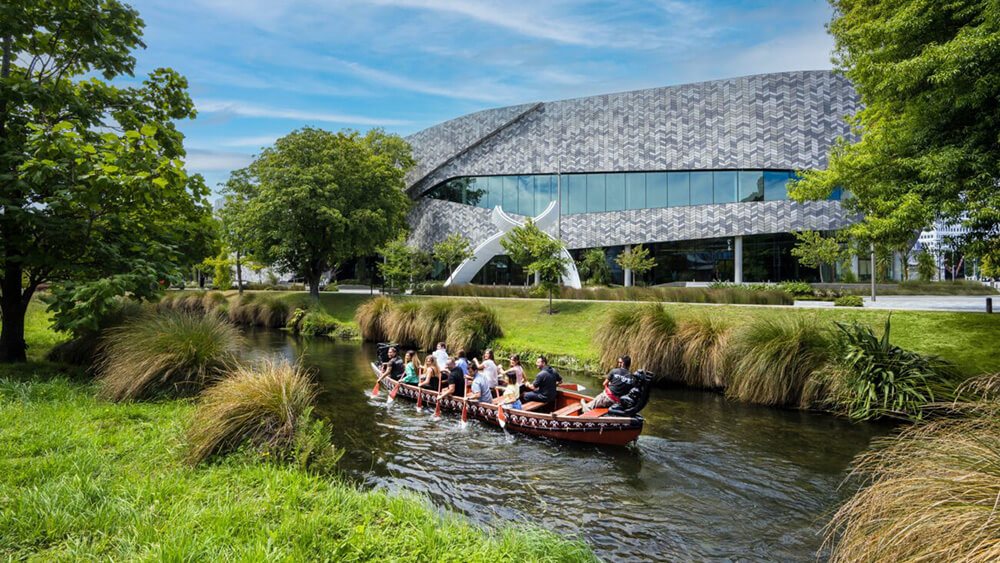
Te Pae Christchurch Convention Centre opened in 2022, a decade after the Christchurch Convention Centre was heavily damaged in an earthquake. The new center was designed to embody important Māori principles, including hospitality, respect, and care for others.
When the International Association for Media and Communication Research (IAMCR) conference participants gathered earlier this year at the Te Pae Conference Centre in Christchurch, New Zealand, the event began with a traditional welcome from the Māori, the island country’s Indigenous people. But their participation didn’t end there: The local Māori sub-tribe partnered with the University of Canterbury | Te Whare Wānanga o Waitaha (UC) as conference hosts, and Māori scholarship and values were threaded throughout the conference, said Donald Matheson, a UC professor of media and communication.
In 2019, UC became the first university in New Zealand to sign a treaty partnership with the local Māori sub-tribe, which includes collaboration between the university and the tribe as research partners and supporting the use of both English and Māori languages. Decolonizing communication is a major topic in the field of media and communication research, said Matheson, who chaired the local conference organizing committee. “Ōtautahi Christchurch is a perfect place to do that.” The conference theme of “weaving people together” — whiria te tāngata in Māori — signaled that the research discussions were “in a country that’s beginning to work through its colonial legacy,” he said.
At the conference, where nearly 1,400 participants gathered from 61 countries to discuss 30 areas of media and communication research, the plenary sessions all connected with the decolonization theme, Matheson said, including a keynote delivered by Māori scholar Linda Tuhiwai Smith, a global authority on Indigenous studies and professor at Te Whare Wānanga o Awanuiārangi, an Indigenous university in Whakatāne, New Zealand.
Organizers also embedded Māori values into the conference experience. “To make that real in practice,” Matheson told Convene via email, “the biggest thing is that people feel welcomed here. Manaaki — the Māori term for welcome — is about more than formalities, but ensuring people are cared for during their stay.” Beyond the hospitality extended to guests at the Te Pae Conference Centre, that included helping participants get quick visa decisions and navigate the city, meeting their accessibility needs, providing an easy-to-use conference app, and “a thousand other small details,” Matheson said.
“It was important to us,” he added, “that a conference with a theme on decolonizing communication connect people to the land and the people of the land.” One day before the conference began, a group of meeting participants planted trees in a coastal forest that is being restored by Ngāi Tūāhuriri, the central tribe of New Zealand’s southern island. “By doing that we’re also giving something back to the sub-tribe and adding another link in the relationship,” Matheson said. “We’re conscious a few trees won’t offset much of the carbon emissions in coming here, but it’s one of many opportunities at the conference to reduce our impact.”
Some conference participants also toured the city’s center with prominent local Indigenous storyteller Joseph Hullen, who talked about the city’s reconnection with its pre-colonial history, Matheson said. The rebuilding of the city center following a 2011 earthquake, including the convention center, was used as an opportunity to use artwork, architecture, and cultural partnerships, Matheson said, to “rewrite the story of place.” .
Barbara Palmer is deputy editor of Convene.
On the Web
Read more about the bicultural history of Ōtautahi Christchurch.
